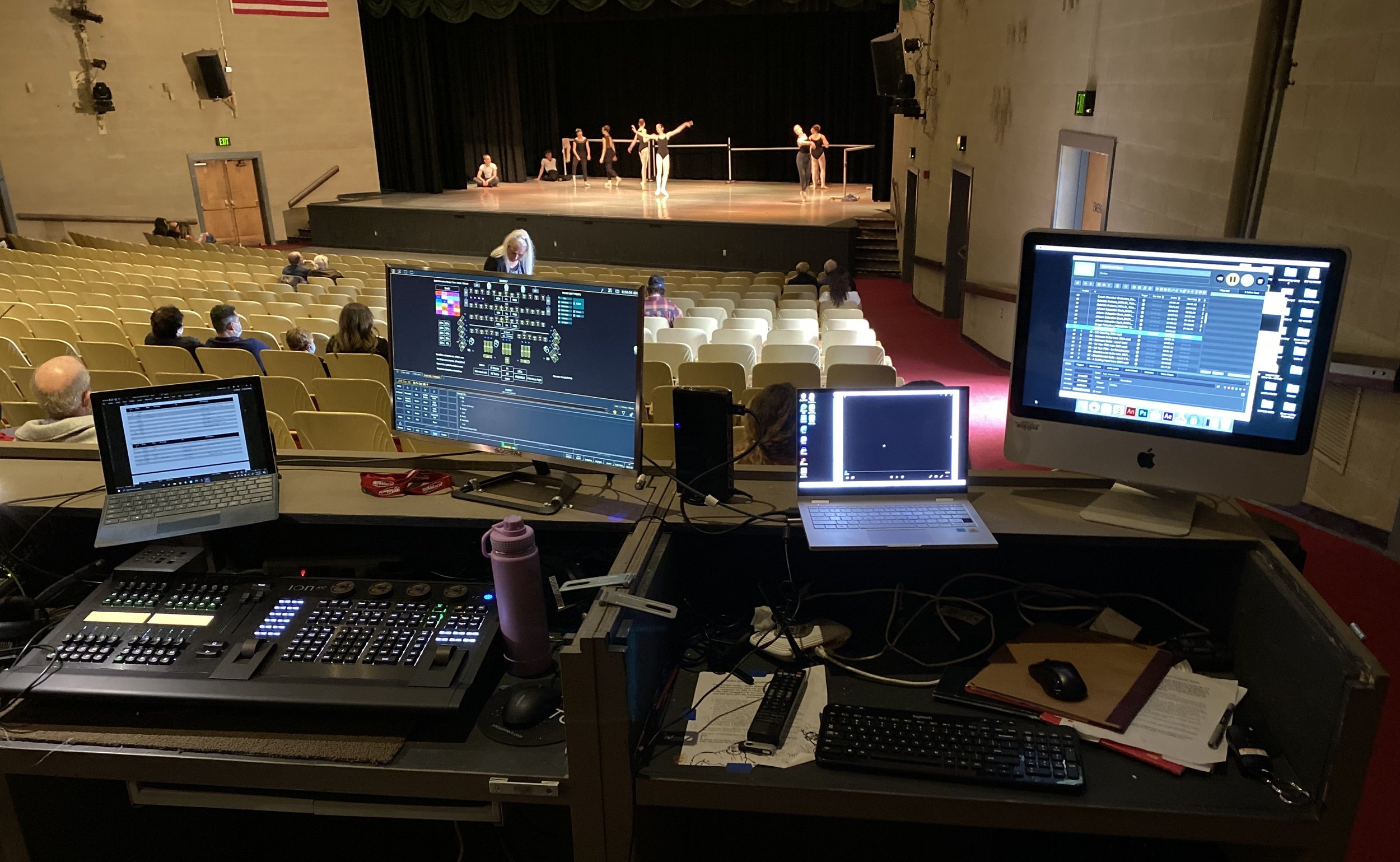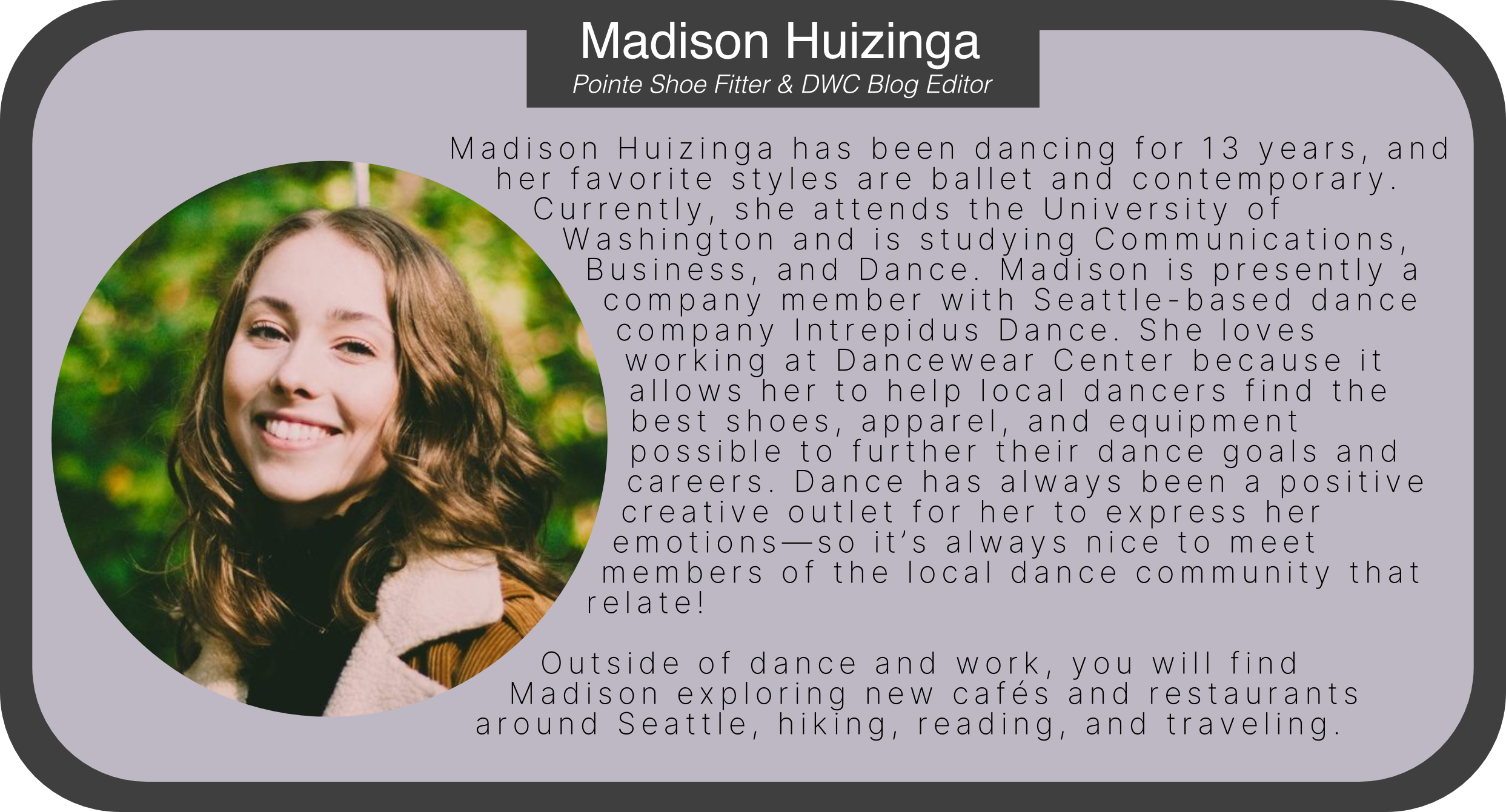Behind the Scenes with Elizabeth Bonar
A Conversation with Local Lighting Director and Stage Manager
By Madison Huizinga, DWC Blog Editor
Photo by Evan Bonar
Putting together a dance production can be a stressful experience for a choreographer and director. When putting the final touches on choreography, managing dancers, and carrying out other tasks, lighting design and stage management can slip to the back of choreographers’ and directors’ brains. Nonetheless, lighting design, stage, and house management are important parts of a production to consider, as they can greatly benefit the experience of a production for audience members and dancers alike when considered in detail. Elizabeth Bonar wears many hats as a local dancer, choreographer, teacher, lighting designer, and stage manager. Tune into Tea & Tendus at DWC Renton on March 13 at 5:30 PM to hear more about Elizabeth’s expertise and ask questions about all things “behind the scenes.”
Elizabeth started dancing at age four. Her parents put her in classes because she couldn’t stop dancing around the house, an experience many dancers are familiar with. She stuck with it throughout high school and college, ending up getting her Bachelor of Science degree in dance at the University of Idaho in 2017.
Growing up, Elizabeth was also frequently exposed to the stage management side of performing, as her mother worked as a stage manager at many of her shows. In high school, Elizabeth’s leadership class was putting on a talent show and needed someone to run the light board. She decided to volunteer. Over the next few years of high school, Elizabeth helped work behind the scenes of other productions here and there. In college, Elizabeth got much more involved with working the light board, taking it upon herself to pull out the manuel and educate herself more on the technicalities of it. She even dedicated her senior year project to lighting design in dance. Following graduation, Elizabeth’s professors asked her to come back to campus and stage manage their pre-professional faculty-choreographed show in the fall, which she has been doing ever since.
“I love helping the dance productions shine the best that they can,” Elizabeth says of lighting design and stage management. She believes that her background as a dancer and choreographer gives her some helpful insight when helping design the lighting of a show and help manage a production. She’s able to better put herself in the shoes of a dancer and choreographer than a manager who may not have experience with performing and choreographing.
The biggest challenge that Elizabeth has seen in her line of work is a lack of communication between dancers and stage managers. For example, a stage manager may not understand what it means when a choreographer points out the way the lighting changes when dancers do “pirouettes.” It can be easy for team members to lose sight of the fact that they’re all working towards the same goal, despite any communication barriers. She also points out that many choreographers and directors put off considering production elements like lighting design until the last minute, without considering how they can help or harm their show. Being able to communicate with stage managers early on about such elements can save choreographers and directors a lot of last-minute stress.
Elizabeth says that it’s helpful for directors and choreographers to find lighting designers and stage managers that they work well with. It’s important for both parties to be open to the suggestions that the other may have because they can offer a unique perspective that may not have been considered before. She also points out that when the choreographer trusts the stage manager to do their part without micro-management, it frees up much more time and energy for them to focus on their choreography and other tasks. Everyone benefits from mutual trust.
Overall, Elizabeth believes that the dance and stage management worlds will benefit from learning more about what the other side does. Dancers working tech on shows, no matter how small, and having an appreciation for what technical workers do and how hard they work is important. “Until you’ve done it, you don’t really understand what [the other side] is doing,” Elizabeth points out. Getting more stage managers with dance backgrounds involved will also benefit the industry, as they already have an understanding of what that other side does.
Elizabeth is stage managing the University of Idaho’s spring production of DancersDrummersDreamers, which runs March 24-26, 2022. She’s thrilled to be working on this production, as it’s the first time it will be on stage in two years. She’s also doing lighting design and technical direction for Ballet Workshop’s production of The Sleeping Beauty, which runs April 23-24, 2022 at the Port Angeles Performing Arts Center. She will also be doing lighting designs for some of Ballet Workshop’s video pieces for the Juan de Fuca Festival of the Arts.
Photo by Melanie Meenan
Elizabeth will also be a special guest at the March Tea & Tendus event at Dancewear Center Renton on March 13th at 5:30 PM. Elizabeth will guide attendees through the basics of lighting, stage, and house management, as well as the best ways for tech crew and choreographers, and directors to collaborate. You can register for the free event here, we hope to see you all there!



